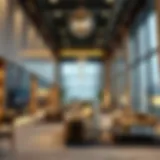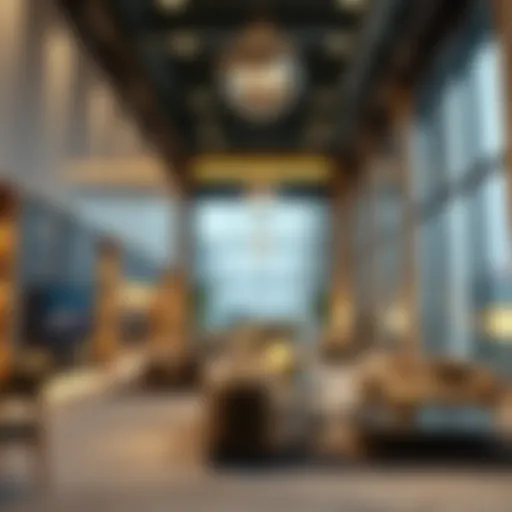Mussafah School List: A Comprehensive Guide
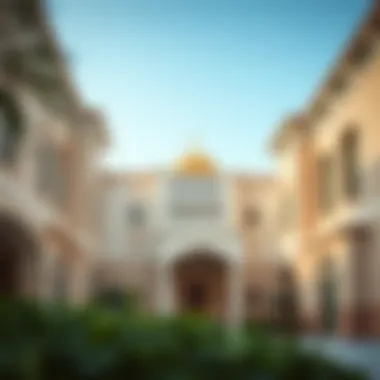

Intro
Mussafah, nestled in the heart of Abu Dhabi, is more than just a growing residential hub; it is a melting pot of cultures and ideas. The schools in this vibrant community are an essential part of its development, offering a plethora of educational choices that cater to a diverse population. Whether you're a parent seeking the right environment for your child's education or an investor looking to understand the intricacies of this educational landscape, this article will guide you through the maze of options available in Mussafah.
Educating the next generation does not solely revolve around traditional academics. It involves nurturing a child's overall growth, which includes extracurricular activities, cultural exposure, and community engagement. As the demand for quality education continues to rise, understanding the schools available in Mussafah is more crucial than ever. In this exploration, we shall dive into the offerings of these institutions, evaluate admission procedures, and examine how various factors can influence a parent's decision-making process.
This journey will also draw attention to the role of educational standards in the region, assessing their impact on community development. Every school has its own charm, strengths, and specializations, and each plays a unique role in shaping their students into well-rounded individuals. But, more importantly, how does this reflect on Mussafah as a whole?
Join us as we explore each facet of Mussafah's educational institutions in depth.
Overview of Mussafah
Mussafah is more than just a neighborhood; it's a dynamic part of Abu Dhabi with a burgeoning residential community and a rich tapestry of cultural diversity. This area has seen a significant transformation over the years, evolving from an industrial hub to a vibrant locale that attracts families and expatriates alike. Highlighting the educational landscape here sheds light on how schools play a crucial role in fostering not only intellectual growth but also a sense of community.
Geographical Context
Nestled about 30 kilometers from the heart of Abu Dhabi, Mussafah is well-connected by major roadways, offering ease of access to other parts of the emirate. Positioned near the coastline and neighboring industrial zones, the geographical setup has facilitated rapid development. Residents benefit from proximity to essential amenities and recreational spaces, making it an appealing choice for young families. This locality is characterized by residential blocks that interweave with parks and commercial areas, creating an inviting atmosphere.
Demographic Profile
The demographic landscape in Mussafah is incredibly diverse. With a melting pot of cultures, the community consists of expatriates from Europe, Asia, and other Middle Eastern regions. This mix enriches the social fabric, providing a unique environment where multicultural interactions thrive. Families seeking educational opportunities value this diversity, as many schools in Mussafah cater to various educational curricula, including international standards. The population density has steadily increased, bringing in a demographic that is young and enthusiastic about educational prospects.
Economic Significance
Mussafah holds considerable economic importance within Abu Dhabi. It hosts a variety of businesses, from manufacturing to retail, thus providing substantial employment opportunities. Educational institutions in the area are pivotal in forging a skilled workforce aligned with the local job market. As industries continue to evolve, the demand for quality education becomes palpable, reinforcing the value of schools in nurturing talent that can seamlessly integrate into the economy. The stability and growth of Mussafah directly relate to its educational offerings, making it an attractive spot for prospective homeowners and investors.
"Education is not just about getting ahead; it's about building a better community for future generations."
For investors and families alike, understanding Mussafah's educational landscape is crucial. The relationship between education and community development is distinctly visible here, offering insights into how schools influence the local economy and social integration.
Educational Landscape in Mussafah
The educational landscape in Mussafah is as diverse as its community, making it a vital aspect of life for families residing in this bustling area. With a mix of public, private, and international schools, the educational offerings cater to a wide spectrum of students. This array not only ensures that every child can find a learning environment that suits their unique needs but also influences the socio-economic dynamics of the community. Education plays a pivotal role, molding future leaders, innovators, and citizens. Hence, understanding the educational landscape can guide parents in making informed choices for their children's futures.
Types of Educational Institutions
Public Schools
Public schools in Mussafah serve as a bedrock in the community, providing accessible education to children from various backgrounds. These schools are funded and managed by the government, emphasizing inclusivity and affordability. One significant aspect that makes public schools popular is their adherence to local educational standards, ensuring that students receive a baseline quality of education.
A key characteristic of public schools is their commitment to the community. They often provide programs that encourage local involvement and create partnerships with families. However, while public schools may excel in affordability, they can face challenges such as overcrowded classrooms and limited resources, which can affect student-teacher interactions. Families must weigh these factors when considering public schooling as a viable option.
Private Schools
Private schools in Mussafah present a different educational pathway, often appealing to parents seeking tailored learning experiences for their children. These institutions typically charge tuition fees, which allows them to operate with more independence from governmental regulations. This autonomy can lead to innovative curricula and specialized programs, setting private schools apart from their public counterparts.
The uniqueness of many private schools lies in their focus on character development alongside academic excellence. Small class sizes often enable more personalized attention, fostering a nurturing environment. However, the cost of tuition can be prohibitive for some families, making affordability a significant consideration. Overall, private schools can provide a customized approach to education, reflecting the priorities of their students and families.
International Schools
International schools are another pillar of the educational framework in Mussafah. Catering primarily to expatriate communities, they offer a globally recognized curriculum that prepares students for an increasingly interconnected world. One of the standout features of international schools is their commitment to cultural diversity; students come from various backgrounds, enriching the learning environment.
The benefit of enrolling in an international school is the exposure to different languages and worldwide perspectives, enabling students to become global citizens. However, the challenge here lies in the expense, as tuition can be quite steep. This factor can limit access to these educational institutions to higher-income families. Parents must consider the balance between the international curriculum’s advantages and the associated costs when exploring educational options for their children.
Curriculum Options
National Curriculum
The National Curriculum provides a structured framework that aligns with local educational standards, which is crucial for seamless integration into the broader educational system. Schools following this curriculum tend to emphasize core subjects like math, science, and literature, preparing students for national exams that are universally recognized.


The main advantage of the National Curriculum is its focus on uniformity, which can help maintain educational quality across public schools. However, while it may lead to standardized testing outcomes, critics argue that it sometimes lacks flexibility, stifling creativity and personalized learning. For families prioritizing a solid academic foundation, the National Curriculum can be an attractive option, but they should also consider the method of delivery and engagement in the classroom.
IB Programs
International Baccalaureate (IB) Programs are heralded for their rigorous and holistic approach to education, promoting critical thinking and intercultural understanding. Schools offering IB Programs often attract students keen on pursuing higher education overseas, as the curriculum is recognized globally.
One of the prominent features of IB is its emphasis on inquiry-based learning, encouraging students to explore real-world issues. This depth of learning cultivates analytical skills necessary for success in the 21st century. Nonetheless, the workload can be intense, and not every student may thrive under such pressure. Parents must gauge their child’s readiness for this challenging but rewarding educational track.
British Curriculum
The British Curriculum has gained a solid foothold in Mussafah as it reflects a comprehensive educational approach that many expatriates favor. Covering key subjects at various levels, it prepares students for GCSE and A-Level examinations, which are primarily recognized in the UK and many other countries worldwide.
The curriculum’s structure allows students to specialize in subjects of their choice during the later years of schooling, fostering individual interests and talents. However, it often requires language proficiency and cultural adaptation, potentially posing hurdles for families new to the system. For expatriate families looking to maintain a connection with their home country's educational context, the British Curriculum can serve as a meaningful bridge.
List of Prominent Schools in Mussafah
Educational institutions play a vital role in shaping a community's future. In Mussafah, the schools not only provide a foundation for learning but also contribute significantly to the local economy and the social fabric of the area. Selecting the right school is crucial for parents and students alike, as this choice can influence their academic performance and holistic development.
The list of prominent schools in Mussafah showcases a diverse array of options, offering everything from traditional curriculums to specialized educational approaches. This flexibility in educational offerings ensures that families can find schools that fit their unique needs. Moreover, understanding each school's strengths and ethos can greatly aid parents in making informed decisions.
Primary and Secondary Schools
School A
School A stands out with its commitment to academic excellence and an inclusive environment. The key characteristic that sets it apart is its personalized approach to education, allowing students to learn at their own pace. This adaptability is particularly beneficial for children who may need extra support or advanced learning opportunities, fostering an atmosphere where every student can thrive.
A unique feature of School A is its focus on community engagement. Students are encouraged to participate in local service projects, instilling a sense of responsibility and connection to their surroundings. However, some parents have noted that the emphasis on personalized education may come at a higher cost than other local institutions, which is a factor to consider.
School B
In contrast, School B is known for its robust extracurricular program that complements academic studies. With offerings ranging from sports teams to music and drama clubs, this school provides a fertile ground for all-round development. The key characteristic of School B is its vibrant community spirit, which is nurtured through events and activities that bring families together.
School B also features a unique mentorship program where older students guide younger peers, promoting leadership skills and enhancing social bonds. However, the workload can sometimes be intense, leading to concerns about students' stress levels. This offers a point of discussion for families considering a balanced approach to academics and personal wellbeing.
School
School C takes a different route, emphasizing technical skills and practical knowledge that prepare students for real-world challenges. Its key characteristic lies in the hands-on learning experiences offered through workshops and projects. This not only ignites students' passion for learning but also equips them with critical job skills.
A unique aspect of School C is its partnerships with local businesses, providing students with internship opportunities that can boost their resumes. However, the narrow focus on technical education might not appeal to families who prioritize a more traditional academic experience, making it essential for parents to assess their educational objectives before choosing this school.
Specialty Institutions
School - Arts Education
School D passionately promotes the arts, making it the go-to choice for aspiring musicians, dancers, and artists. The key characteristic of this institution is its comprehensive arts curriculum, which includes visual arts, performing arts, and music education. This nurturing environment allows students to express their creativity and cultivate their artistic talents.
One unique feature of School D is the notable collaboration with local artists and art institutions; this enriches the curriculum and provides students with real-life experiences in the arts. Yet, some might argue that focusing heavily on the arts may lead to a lack in other academic subjects, which could influence overall educational development.
School E - STEM Focus
On the other hand, School E is fully dedicated to STEM education. The key characteristic of this school is its rigorous program that emphasizes Science, Technology, Engineering, and Mathematics. Recognizing the increasing demand for STEM professionals, this institution prepares students with cutting-edge skills that can lead to lucrative career paths.
School E incorporates innovative teaching methods and state-of-the-art technology in its classrooms, providing students with opportunities to engage in real-world problems and solutions. However, while the STEM focus is impressive, some critics believe that it can overshadow other essential subjects like the arts and humanities, potentially leading to an imbalanced education.
Overall, the array of schools in Mussafah reflects the community's commitment to diverse educational paths. For families weighing their options, considering each school's purpose, unique attributes, and potential trade-offs is essential in finding the right fit for their children. In a landscape where education is paramount for personal and professional growth, making the right choice has never been more critical.
Academic Performance and Accreditation
Understanding academic performance and accreditation within the context of Mussafah’s educational institutions is crucial for parents, investors, and anyone invested in the local community's future. These elements not only reflect the quality of education provided but also influence the overall growth of student potential and marketability in the job sector.
Accreditation serves as a stamp of approval from recognized bodies that assess the standards of educational institutions. It assures parents that the school adheres to certain performance benchmarks, which can be a deciding factor in their selection. Moreover, a school’s accreditation status often correlates with its student outcomes, making it an anchor of trust among families looking to invest in their children's education.
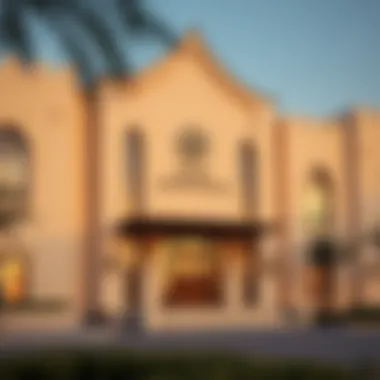

The implications of strong academic performance transcend individual achievement; they pave the way for community advancement and contribute significantly to the local economy. When students excel in terms of grades and skills, they not only enhance their own life trajectories but also boost the reputation and desirability of the community. Parents looking for schools must weigh these factors carefully to ensure that their children receive the best possible education.
"Education is the passport to the future, for tomorrow belongs to those who prepare for it today."
School Ratings and Reviews
In the digital age, the efficacy of school ratings and reviews can’t be overlooked. Platforms like Facebook, Reddit, and numerous educational forums serve as converging points for parents to share their experiences and provide feedback on schools. This granular perspective brings to light what each institution offers beyond just brochures and marketing lingo.
- Grading Systems: Many parents utilize rating systems to gauge academic success. Principles such as those from the British Schools Overseas (BSO) or various educational statistics websites can highlight quantitative measures like test scores and graduation rates.
- Testimonials and Feedback: Reviews from fellow parents are often more telling than official ratings. They give insight into classroom environments, teacher effectiveness, and extracurricular activities, allowing potential enrollees to make informed decisions.
- Social Media Insight: Easy access to school pages on social media can illuminate current events or achievements that might not feature on their official websites, adding a layer of transparency.
Accrediting Bodies
The role of accrediting bodies in Mussafah is paramount. These entities assess and verify various educational institutions to guarantee they uphold regulated standards. Schools, whether public or private, rely on these organizations for recognition and credibility.
- Local and International Bodies: Schools in Mussafah may pursue accreditation from both local educational authorities and international accrediting organizations. This dual approach broadens their acceptance and enhances the academic fabric of the area.
- Quality Assurance: Accreditation from bodies like the Council of International Schools (CIS) assures parents that their children are receiving an education that meets or exceeds international benchmarks, covering both curriculum and instruction quality.
- Continual Assessment: Accredited schools must engage in periodic reviews to maintain their status, ensuring a continuous commitment to quality improvement and responsiveness to educational trends.
Ultimately, the academic performance and accreditation of schools in Mussafah significantly contribute to the educational landscape, providing a well-rounded experience for students and peace of mind for parents.
Extracurricular Activities
Extracurricular activities play a pivotal role in the educational framework within Mussafah, where the diverse student population thrives beyond just academics. These programs provide vital avenues for students to explore interests, cultivate skills, and forge friendships, invaluable in a community that emphasizes development and growth.
Participation in extracurriculars can set the stage for a well-rounded education. Students learn teamwork, leadership, and resilience—qualities that will serve them well in their future endeavors. These activities often bridge gaps between academic learning and real-world applications, allowing for a more robust educational experience, which is crucial in today’s fast-paced world.
Key benefits of engaging in extracurricular activities include:
- Skill Development: Students can discover talents in areas such as sports, arts, or community service that may not be tapped in regular classroom settings.
- Social Skills: Engaging with peers in a less formal environment allows children to build connections and social networks that can enhance their school experience.
- Mental Health Benefits: Regular physical activity and creative engagement contribute to improved mental health, reducing stress and supporting emotional well-being.
- College Application Advantage: In an increasingly competitive environment, colleges look favorably on applicants who show involvement and accomplishments outside of academics.
For parents, understanding the range of extracurricular activities available is essential when choosing a school. It highlights how schools in Mussafah not only focus on academic success but also prioritize the growth of students as individuals.
"Education is not preparation for life; education is life itself." – John Dewey.
Sports Programs
Sports programs are a cornerstone of the extracurricular landscape in Mussafah schools. They promote physical fitness while teaching discipline, commitment, and the importance of healthy competition. Schools often provide facilities for various sports, including soccer, basketball, and swimming. These programs not only foster a spirit of teamwork but also create a platform for exceptional talent to shine.
Schools like School A and School B boast well-established teams that participate in regional competitions. Students involved often speak to how these experiences build their character and leadership skills. The camaraderie developed among teammates can translate into lasting friendships as well, fostering community ties within Mussafah.
Cultural and Arts Programs
Cultural and arts programs enrich the educational experience by encouraging creativity and self-expression. These programs in Mussafah encompass a range from visual arts to drama and music classes. Engaging in the arts allows students to further develop their imaginative capacities while also learning about cultural diversity and heritage.
Schools often organize events such as art exhibitions, theater productions, and music festivals, giving students the opportunity to showcase their work. School C is particularly noted for its strong emphasis on the performing arts, providing students platforms to explore acting, dance, and music.
Moreover, these programs contribute to emotional intelligence and cultural awareness, essential traits in today’s interconnected world. By participating in arts and cultural initiatives, students not only gain skills but also contribute positively to the vibrant community fabric of Mussafah.
Admission Processes
Understanding the admission processes for schools in Mussafah is essential for parents seeking the best educational pathway for their children. Securing a spot in a reputable school does not merely depend on the child’s performance but also involves navigating through a series of structured steps. The admission process can often seem daunting, but a thorough comprehension of it can alleviate a lot of the associated stress.
Application Steps
The application process comprises several essential steps that parents should be aware of to ensure a smooth transition into their chosen school. Below are some typical steps that are often found in the admission procedures:
- Research Schools: Begin by researching various schools in Mussafah to identify one that aligns with the educational goals for your child. Look into their curriculum, extracurricular offerings, and overall reputation.
- Prepare Required Documents: Most schools require documentation like birth certificates, previous report cards, and sometimes even letters of recommendation. Having these documents ready can speed up the process.
- Fill Out Application Forms: Each school has its own application form that must be completed with detailed information about the child and family. Be precise and thorough while providing this information.
- Schedule Interviews or Assessments: Some schools may require potential students to attend an interview or take a placement assessment. Prepare your child for this, as it may play a significant role in their admission.
- Submit the Application: Once everything is in place, submitting the application before the deadline is crucial. Ensure all documents accompany the form.
- Await Responses: After submission, there is typically a waiting period. Schools often notify parents of acceptance or rejection within a specified timeframe, so patience is key.
Key Deadlines
Timelines related to school applications can vary widely, and knowing these key deadlines is critical to preventing last-minute rushes or missed opportunities. Here are some common deadlines to keep in mind:
- Application Deadlines: Certain schools may have set dates by which applications must be submitted, usually falling between December and March for the upcoming academic year. Watch closure dates that are often well publicized but can be easily overlooked.
- Assessment Dates: If the school requires assessments, there may be specific dates when these are scheduled, often a month or two after the application deadline. Mark your calendar accordingly!
- Notification Period: Most institutions will provide a timeline indicating when families can expect a decision on their application. This could range from a few weeks to several months after submission.
- Enrollment Deadlines: Once accepted, parents must confirm enrollment by a set date to reserve their child's spot. This often entails submitting additional forms and sometimes deposits.
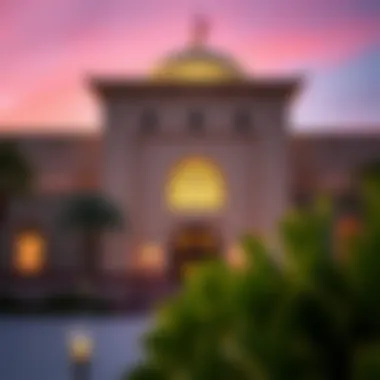

"Preparing your child for school is as much about getting the right school as it is about the right time. Don’t leave it to chance!"
Getting familiar with these processes and deadlines can greatly ease the task of school selection for parents in Mussafah. Ultimately, a well-planned approach amplifies the chances of finding a. school that perfectly matches a child’s educational needs.
Parental Considerations
Navigating the educational landscape in Mussafah can feel like a daunting task for many parents. This section addresses the pivotal role parents play in shaping the academic journey of their children. Understanding what options are available, evaluating each institution's strengths, and recognizing community dynamics are crucial steps in making an informed decision. Parents should consider educational needs and community involvement as essential factors.
Assessing Educational Needs
Coming to grips with your child's educational needs is like piecing together a puzzle that reveals their strengths and weaknesses. Factors such as learning styles, interests, and future aspirations must be carefully evaluated. For instance, a child passionate about science might thrive in a school with robust STEM programs. In contrast, one who leans towards the arts may flourish in an institution that emphasizes creativity.
- Understanding Learning Styles: It is essential to observe how children respond to various teaching methods. Some may prefer hands-on activities, while others excel in lecture-based formats.
- Identifying Interests: Regular discussions about school subjects and hobbies can offer insights into what captivates your child. Are they enthusiastic about reading, or do they relish in building models?
- Future Aspirations: It's worth pondering your child's long-term goals. If they dream of pursuing a career in engineering, a school with advanced math and science classes is beneficial.
By keeping these elements in focus, parents can select educational institutions that cater to their children’s specific needs, ensuring a more engaged and fruitful learning experience.
Community Involvement
Community involvement transcends volunteering or attending school events; it includes fostering relationships between families and educational institutions. When parents engage with schools, they are not just spectators but active participants in their children’s education. This involvement nurtures a supportive learning environment, where children feel encouraged and connected.
- Building Relationships: Establishing rapport with teachers and other parents can create a support network. Being involved in PTA meetings or school committees can help bridge gaps between home and school.
- Understanding the School's Mission: Schools often have unique missions and cultures. Participating in community discussions allows parents to align their educational goals with the school’s objectives.
- Encouraging Cohesion: Active participation fosters a sense of community, allowing families to share resources and insights, enriching the educational experience for everyone.
Involving parents in the school ecosystem creates a vibrant community that contributes to overall student success and well-being.
Impact of Education on Community Development
Education serves as a cornerstone of development in any community, and Mussafah is no exception. The role of schools extends far beyond academics; they are hubs of social cohesion, economic growth, and cultural exchange. By investing in educational institutions, Mussafah stands to benefit not only the students but also the entire locality.
Role of Schools in Local Economy
Schools ill fit within the broader economic fabric of Mussafah. When schools thrive, the local economy feels the upswing. Schools create jobs—not just for teachers and administrative staff but also for support personnel, including custodial and maintenance crews, which are vital for the day-to-day operations.
Moreover, educational institutions attract families to the area. Parents often seek neighborhoods with good schools, which leads to increased demand for housing, boosting property values. This ripple effect is felt across various sectors, from local businesses gaining customers to construction projects to accommodate growing families. Hence, schools don’t just educate children; they stimulate economic vibrancy in their communities.
- Higher Property Values: A community with renowned educational institutions sees an uptick in property demand.
- Job Creation: Schools hire numerous staff, thus injecting money into the local economy.
- Local Business Growth: Restaurants, shops, and entertainment areas benefit from the patronage of families drawn to good schools.
"Education is the great equalizer of our time." – Unknown
Social Integration through Education
The educational landscape in Mussafah also champions social integration, yielding demographics of varying cultures and backgrounds interacting within a shared environment. Schools serve as melting pots where children learn not only their subjects but also about the diversity that exists in their communities.
Through various programs and events, schools encourage students to embrace differences, laying the groundwork for an inclusive society. For instance, multilingual education initiatives help non-native speakers feel welcome, thus fostering a sense of belonging. Furthermore, activities that promote cooperation and teamwork break down societal barriers, enabling friendships and networks to form across cultural lines.
This aspect of schooling can be richly multifaceted:
- Cultural Festivals: Schools often host events celebrating different cultures, allowing families to share traditions.
- Collaborative Projects: Joint initiatives among students from diverse backgrounds work to cultivate empathy and understanding.
- Community Outreach: Schools frequently engage in outreach, partnering with local organizations to promote volunteerism and service.
In summary, education in Mussafah is fundamentally intertwined with the economic and social fabric of the community. By nurturing schools, the community sows the seeds for a more robust economy and a cohesive society. The benefits derived extend far beyond classroom walls, enriching lives and paving the way for a brighter future.
Finale
The significance of education in Mussafah cannot be overstated, as it serves as a cornerstone for both family choices and the community's advancement. In the bustling life of this area, the schools have become more than mere educational institutions; they are vital contributors to social cohesion and economic growth.
Summarizing Key Insights
Mussafah’s educational environment embodies a diverse array of schools that cater to various needs. From public institutions providing localized education to several private and international options that reflect global curricula, parents are afforded a range of choices. Understanding the unique curriculums being offered—like the British system or International Baccalaureate—plays a crucial role in making informed decisions that align with family values and children’s learning styles.
Not to mention, the schools in this area are not just focused on academic excellence. They also emphasize extracurriculars, encompassing sports, the arts, and community engagements, shaping well-rounded individuals. It's this balance of academics and personal development that sets Mussafah apart, drawing families from different cultural backgrounds, enhancing the community’s vibrancy.
Future Perspectives on Education in Mussafah
Looking ahead, the educational landscape in Mussafah seems poised for notable developments. Anticipated investments in school infrastructure and innovative educational practices promise to enhance the learning environment further. There’s a discernible trend towards integrating technology in education, which reflects broader global shifts.
Moreover, as Mussafah continues attracting expatriates and international families, the demand for international educational frameworks is likely to increase. This could spur schools to refine their offerings, making them more competitive and tailored to meet the needs of a dynamic student body. The focus on community integration through education suggests a future where schools serve as hubs for cultural exchange and social enrichment, fostering collaboration between diverse groups in the area.
In essence, the future of education in Mussafah is bright, evolving in ways that reflect both the needs of its resident population and the aspirations for a thriving, cohesive community.


